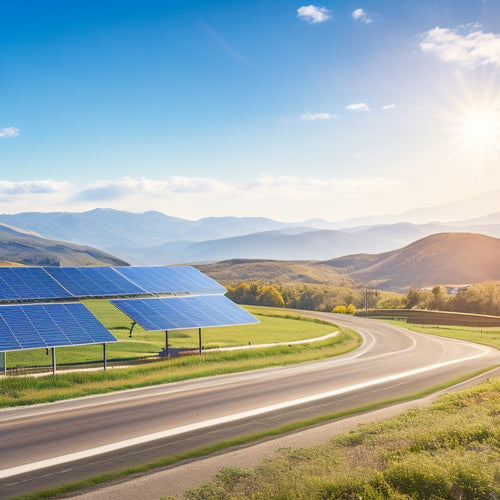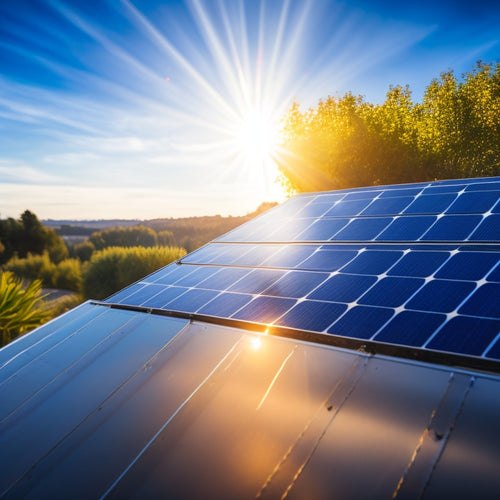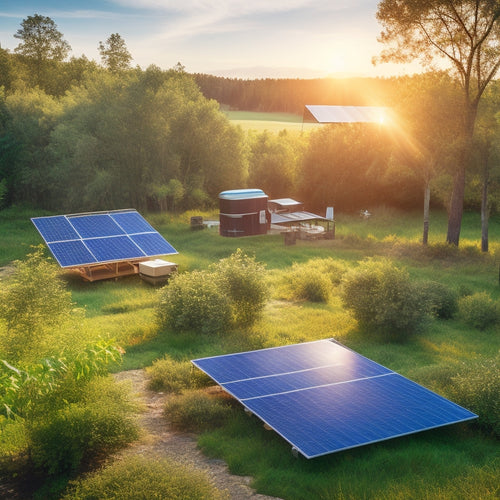
Installing a Solar Panel System on Your Property in 3 Steps
Share
Installing a solar panel system on your property involves three essential steps. First, assess your energy needs by reviewing past usage to determine the ideal system size. Next, choose high-efficiency solar panels and suitable inverters that maximize energy production. Finally, investigate financial incentives such as federal tax credits and local rebates to minimize upfront costs and enhance long-term savings. Completing these steps not only reduces your electricity bills but also increases your property's market value and contributes to a cleaner environment. You'll uncover more strategies for maximizing your solar investment soon after!
At a Glance
- Assess your energy needs and consumption patterns to determine the optimal solar panel system size for your property.
- Research and take advantage of federal, state, and local tax incentives to reduce installation costs.
- Choose high-efficiency solar panels and the appropriate inverter type to maximize energy production and long-term savings.
- Hire a reputable solar installation company to ensure proper setup and compliance with local regulations.
- Monitor system performance regularly to optimize energy production and maintain financial benefits over time.
Lower Long-Term Energy Costs
By installing a solar panel system, you can greatly reduce your electricity bills over time, leading to substantial savings.
A thorough energy needs assessment helps determine the ideal size of your solar panel system based on your usage patterns.
Additionally, you can take advantage of various tax incentives that further lower your upfront costs.
This combination makes solar energy not just an environmentally friendly choice, but a financially smart one as well.
Reduced Electricity Bills
Installing a solar panel system can greatly reduce your electricity bills, offering a long-term solution to rising energy costs. By generating your own electricity, you tap into solar savings that directly impact your monthly expenses. This means less reliance on your utility provider and more control over your energy consumption.
As you utilize the sun's power, you're not just saving money; you're also moving toward energy independence. With each kilowatt-hour produced by your solar panels, you decrease the amount of electricity you need to purchase. This shift can lead to substantial savings over time, allowing you to allocate funds towards other priorities or investments.
Moreover, the protection against fluctuating energy prices is priceless. While traditional electricity costs can rise unpredictably, your solar energy remains a stable and sustainable choice. By adopting this technology, you enable yourself financially and reduce your long-term energy costs.
In a world where energy independence is increasingly important, a solar panel system not only enhances your financial freedom but also contributes to a greener environment.
Take control of your energy future and enjoy the benefits that come with reduced electricity bills.
Tax Incentives Available
Taking advantage of tax incentives can greatly enhance the financial benefits of your solar panel system, further lowering your long-term energy costs. By utilizing federal credits and state rebates, you can notably offset the initial investment, making solar energy more accessible and freeing you from the shackles of high utility bills.
Here's a breakdown of the key incentives available:
| Type of Incentive | Description | Potential Savings |
|---|---|---|
| Federal Credits | A percentage of your installation cost is credited on your federal tax return. | Up to 30% of installation costs. |
| State Rebates | Many states offer cash rebates for installing solar systems. | Varies by state, often several thousand dollars. |
| Local Incentives | Some local governments provide additional rebates or tax breaks. | Potentially thousands more in savings. |
These incentives can lead to substantial savings, enabling you to take control of your energy future. Don't miss out on the opportunity to maximize your investment—research the incentives in your area and start your expedition toward energy independence today!
Environmental Impact Reduction
By installing a solar panel system, you greatly lower your carbon footprint and contribute to a cleaner environment.
Solar energy is a sustainable source that reduces reliance on fossil fuels, helping mitigate climate change.
Additionally, financial incentives and rebates can make solar installation more accessible, allowing more people to participate in this green initiative financial incentives.
Embracing this technology not only benefits you financially but also plays an essential role in preserving our planet for future generations.
Lower Carbon Footprint
The notable reduction in your carbon footprint is one of the most persuasive reasons to evaluate a solar panel system. By utilizing solar energy, you're not just powering your home; you're actively engaging in carbon offset strategies that contribute to a healthier planet.
Traditional energy sources rely heavily on fossil fuels, releasing harmful greenhouse gases that contribute to climate change. When you switch to solar, you considerably decrease your reliance on these sources, minimizing your environmental impact.
Implementing renewable energy policies at the local and national levels further improves the effectiveness of your solar panel system. These policies encourage sustainable practices and provide incentives for homeowners like you to invest in renewable technologies.
By adopting solar power, you align yourself with these initiatives, demonstrating your commitment to reducing carbon emissions and promoting environmental well-being.
Choosing solar power is more than a financial decision; it's a statement of freedom. You're taking control of your energy source, contributing to a sustainable future, and leaving a smaller carbon footprint for generations to come.
Seize this opportunity to create a positive impact and become a part of the growing movement toward a cleaner, greener world.
Sustainable Energy Source
While many energy sources contribute to environmental degradation, solar power stands out as a truly sustainable option that considerably reduces your ecological footprint. By utilizing the sun's energy, you're not only adopting renewable technologies but also taking a significant step toward energy independence. This shift allows you to break free from the constraints of traditional fossil fuels that pollute our air and water.
Investing in a solar panel system means you're generating clean energy that can power your home or business, minimizing greenhouse gas emissions and decreasing reliance on non-renewable resources. Each kilowatt-hour you produce reduces the demand for energy generated from harmful sources, contributing to a healthier planet.
Moreover, solar energy systems often come with the added benefit of lower long-term energy costs. As you gain energy independence, you're less susceptible to fluctuating energy prices and supply disruptions.
Technical Specifications Overview
Understanding panel efficiency ratings and comparing inverter types are vital steps in maximizing your solar system's performance.
Additionally, evaluating battery capacity and type is fundamental for ensuring that your energy needs are met during peak usage and outages, as battery capacity and type matters when planning your energy management strategy.
You'll want to evaluate how these technical specifications impact your energy production and overall return on investment.
Panel Efficiency Ratings
Panel efficiency ratings are vital metrics that determine how effectively a solar panel converts sunlight into usable electricity. Higher efficiency means more energy captured from the same amount of sunlight, directly impacting your energy independence and freedom from traditional power sources.
As you investigate different options, it's important to pay attention to these ratings because they reflect the latest panel technology advancements.
Most modern solar panels boast efficiencies ranging from 15% to over 22%. This leap in efficiency is largely due to innovations in materials and design, allowing panels to generate more power within a smaller footprint.
When you invest in a solar panel system, consider not just the initial cost but also the long-term benefits tied to efficiency and solar panel lifespan. High-efficiency panels generally last longer, providing consistent energy production, which ultimately translates to savings on your energy bills.
Choosing efficient panels enables you to maximize your investment while minimizing your carbon footprint.
To achieve true energy freedom, understanding panel efficiency ratings is key to selecting a system that suits your needs and aligns with your values.
Inverter Types Comparison
When it comes to selecting the right inverter for your solar panel system, knowing the differences between inverter types is essential. The three main types are string inverters, microinverters, and power optimizers. Each has unique characteristics that impact your system's inverter efficiency and overall performance.
String inverters are the most common and cost-effective choice, but they can be limited if one panel underperforms. Microinverters, on the other hand, are installed on each panel, maximizing energy production and providing better inverter efficiency, especially in shaded areas. However, they can be pricier upfront.
Power optimizers combine features from both string inverters and microinverters, ensuring panels operate at their peak performance while maintaining a lower cost than microinverters.
Regarding inverter lifespan, string inverters typically last 5-10 years longer than microinverters, which usually last around 25 years, depending on the brand and installation quality.
Ultimately, your choice should align with your energy needs and budget. Investing in the right inverter can enhance your system's efficiency, reduce long-term costs, and grant you greater energy independence.
Consider your options carefully to maximize your solar experience.
Selecting Based on Energy Goals
To effectively select a solar panel system, you need to assess your energy needs first.
Consider how much energy you consume and how much you aim to produce, as this will guide your system size and type. Conducting an energy audit to identify energy-intensive appliances can provide useful perspectives for your assessment.
Additionally, researching available solar incentives will help you maximize your potential savings.
Setting clear budget priorities will help you balance quality and cost, ensuring you make a sound investment in your energy future.
Assess Energy Needs
How can you determine the right size and type of solar panel system for your needs? First, you need to conduct an energy consumption analysis. This involves evaluating your electricity usage over the past year to establish how much energy you typically consume. Understanding your energy goals—be it reducing bills, achieving energy independence, or adapting to solar energy trends—will guide your decisions.
To help you visualize your options, here's a table illustrating potential energy needs based on common household types:
| Household Type | Average Monthly Usage (kWh) | Recommended System Size (kW) |
|---|---|---|
| Apartment | 300-500 | 3-5 |
| Small Home | 500-800 | 5-7 |
| Medium Home | 800-1,200 | 7-10 |
| Large Home | 1,200-1,800 | 10-15 |
| Eco-Friendly Home | 500-1,000 | 5-8 |
Set Budget Priorities
After evaluating your energy needs, setting budget priorities becomes imperative in selecting a solar panel system that aligns with your goals. You should start by determining your budget allocation, considering both the upfront costs and long-term savings. Assess how much you can comfortably invest without compromising other financial responsibilities.
Next, investigate various financing options. Many solar companies offer flexible payment plans, loans, or leasing that can ease the burden of initial costs. Research available incentives—such as federal tax credits or local rebates—that can greatly reduce your overall expenditure.
Keep in mind that the cheapest option isn't always the best. Focus on quality and efficiency, as these factors will influence your energy independence and return on investment.
Higher Property Value Increase
When you install a solar panel system, you're not just enhancing your home's energy efficiency; you're also elevating its market appeal.
Potential buyers are increasingly drawn to homes with sustainable features, making your property more attractive and potentially increasing its value.
Energy Efficiency Appeal
Investing in a solar panel system not only reduces your energy bills but also greatly enhances your property's value. As energy efficiency trends continue to gain momentum, potential buyers are increasingly seeking homes equipped with energy efficiency technologies.
By installing solar panels, you position your property as a forward-thinking investment that aligns with these trends.
When you install a solar panel system, you're not just making your home more sustainable; you're also appealing to a market that values energy independence and reduced utility costs. This intrinsic value can lead to a significant return on investment when you decide to sell.
Research indicates that homes with solar energy systems can command a higher price—often recovering more than you initially spent on the installation.
Moreover, energy-efficient homes are typically rated more favorably in real estate listings, attracting the interest of eco-conscious buyers.
Frequently Asked Questions
What Are the Financing Options for Installing Solar Panels?
When considering financing options for solar panels, you can investigate lease agreements that offer low upfront costs, or take advantage of tax incentives that can greatly reduce your overall investment, giving you greater financial freedom.
How Do I Choose a Reliable Solar Panel Installer?
Think of choosing an installer like picking a trusted guide for your expedition. Check their qualifications and immerse yourself in customer reviews; these will illuminate their reliability, ensuring your solar quest starts on solid ground.
What Permits Are Needed for Solar Panel Installation?
To install solar panels, you'll need to check local regulations and obtain necessary permits. Following installation guidelines guarantees compliance, safeguarding your investment while granting you the freedom to utilize renewable energy efficiently and responsibly.
How Long Does the Installation Process Typically Take?
The installation timeline for solar panels usually takes one to three days, but unexpected installation challenges can extend it. Being prepared helps you maneuver these obstacles, ensuring a smoother process and quicker energy independence.
What Maintenance Is Required for Solar Panels?
Just like a well-tuned engine, your solar panels need care. Regular cleaning techniques and performance monitoring guarantee ideal efficiency. Stay proactive to utilize the sun's energy and enjoy the freedom of renewable power.
Explore More
By installing a solar panel system, you're not just slashing your energy bills; you're also playing an essential role in reducing your carbon footprint—think of it as trading in your horse and buggy for a sleek electric car. With careful selection based on your energy goals and an understanding of technical specifications, you can enhance your property's value and contribute to a sustainable future. Welcome this opportunity; the sun's shining, and so are your savings!
Related Posts
-

Is Switching to Green Energy Solutions Easy
Switching to green energy solutions isn't just easy; it's also beneficial. You can greatly cut utility costs and enjo...
-

How Efficient Are Thin Film Solar Cells
Thin film solar cells provide an innovative approach to energy generation, boasting efficiency rates generally betwee...
-

Top Off Grid Solar Batteries for Renewable Energy
When seeking top off-grid solar batteries for renewable energy, consider options with advanced battery chemistry, suc...


